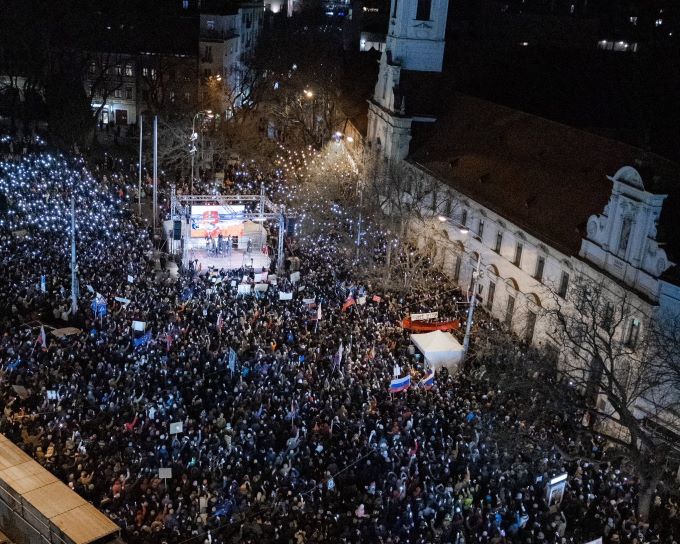Slovakia’s parliament has approved government plans to reorganise the country’s public broadcast service amidst charges that the controversial changes will place broadcaster RTVS under direct political control, limiting media freedom and independence. Opposition parties reportedly walked out before the vote on the bill, which was approved by 78 government legislators. The new legislation is slated to take effect next month.
The changes are viewed as part of efforts by Robert Fico‘s nationalist cabinet to reshape Slovak institutions and policy issues ranging from state prosecutors and police, to environmental regulations and those pertaining to NGOs. Some of the changes sparked public protests in Slovakia and have set off alarms in the European Union about democratic controls.
The new legislation also changes how members of the RTVS oversight council are selected, a body the current government has accused of bias and of ignoring opinions outside “the mainstream”. RTVS staff along with members of the opposition, plus certain EU observers and media advocacy groups, fear the implicit threat to media independence and claim the inherent aim is to stifle critics of the government.
Culture Minister Martina Simkovicova told the parliament before Thursday’s vote that the draft bill was designed to strengthen nothing more than RTVS’s “public-law character” and to “ensure respect for plurality and the principles of democracy and free creation.”
Under the new law, the incumbent RTVS director faces being replaced years before his term expires, and a replacement being named by the revised nine-member council. Council members are appointed by the culture minister and parliament. RTVS will also change its name to Slovak Television and Radio (STVR).
Calling it a “black day” for public broadcasting and media in Slovakia, RTVS Director Lubos Machaj claimed the proposed changes “combined with the absence of full leadership, could destabilise the institution and jeopardise production”. Michal Simecka, head of Progressive Slovakia (PS), the leading opposition party, denounced the law as shameful, promising to challenge it at the Constitutional Court.
“Today, the Parliament definitively cancelled the free public media – RTVS. Starting July 1, it will be replaced by the docile and tame STVR. It is a shame for the government coalition and a shame for Slovakia as well. However, we say – you will not silence us or the free media! We will challenge this law at the Constitutional Court,” Simecka posted on X.
The European Broadcasting Union and European Commission Vice-President Věra Jourová are among those who have raised objections. Reporters Without Borders (RSF) decried the government’s politicisation of the public broadcaster, saying the move “would fatally compromise its independence”.
From the time it came to power last year, the Fico-led coalition has taken issue with the media and others it claims have been hostile to it. Fico is continuing his recovery at home, having been seriously wounded by a gunman in May, an attack that served to exacerbate the political polarisation besetting the country’s population of 5.4 million.

